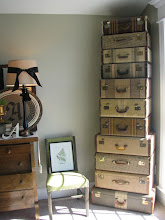Ahhh yes, another piece of furniture for my son's room. This was originally a tv stand, but it will be used for storing bins of toys. It's sturdy and made from oak.
Lately I've had several questions about spray painting furniture. I did a little tutorial a while back, but I thought I'd go more in depth here.
**If you're a painting pro,
you can skip all of this and scroll down
to the photo of the finished project**
you can skip all of this and scroll down
to the photo of the finished project**
The prep work is VERY important to a good paint job. If the piece already has a paint or stain finish you will need to give it a good cleaning. A solution with a degreaser works best, but you can use a good dish soap too. This will take off any build up of stuff like food, hand prints, everyday grime, etc. Be careful not to soak the wood! If the piece needs to have any repairs like gluing or filling in holes or cracks, this is the time to do it.
Next you need to sand the piece. I prefer using a medium grit. You don't need to sand the project until it's bare. You only need to make the existing surface a little rough so that the paint will adhere. Sanding the original finish makes the new paint able to bond to the old. You can use a liquid sander if there's a lot of detail to your pieces. When I use the liquid, I will often go over the piece again with a light sanding in the areas where it will get the most wear.
 Be sure to wipe everything down with a tack cloth or a dry, clean rag to get off ALL of the dust. If your project has areas that don't need to be painted (like the insides of drawers) you should mask off those areas with newspaper and painter's tape.
Be sure to wipe everything down with a tack cloth or a dry, clean rag to get off ALL of the dust. If your project has areas that don't need to be painted (like the insides of drawers) you should mask off those areas with newspaper and painter's tape.If I'm sure that the original finish was a latex or spray paint, I don't use a primer. However, if I've sanded off the finish, or if the finish was a factory finish, then it's important to prime your project. Primer helps the paint adhere well. It also helps avoid any strange reactions that can occur when different paint chemicals mix. Use a quality high adhesive primer, unless you want to distress your piece after it's painted---sanding it to make it look worn. If you prime then sand, you'll uncover the primer instead of the wood and it may not be the look you're after. But if you choose not to prime, then the paint may continue get distressed/chipped with use.
 Use light colored primer for light paint colors
Use light colored primer for light paint colorsand dark primer for dark paint colors.
Now it's time to paint. Shake the can well. Hold the can about ten inches from your project and spray in a steady back and forth motion, slightly overlapping each stroke. I like to think of my hand as an automated arm, holding the spray the same distance across the piece. I also start spraying about an inch to the side of the piece and stop an inch after it. I DO NOT push on the spray continually. You get a much more even spray if you start and stop with each stroke, keeping the can in motion as you spray. Shake the can occasionally between spray strokes.
It's important to spray a LIGHT coat of paint! Don't try to saturate the piece with paint on the first coat because the paint will run. If this occurs, wait for the paint to dry and then lightly sand the run marks. Give the piece a light sanding between each coat to remove imperfections, then wipe off the dust. I give each piece at least two coats of paint, and usually several coats on the areas that will receive the most wear.
HERE'S MY TIP: Do Not be tempted to use every ounce left in the can on your final coat. I have found that the very bottom of the paint can does not go on as smoothly. It may spritz out or look a little powdery. When dry, the finish can appear blotchy, shiny in some spots and dull in others. You can always finish off the can by using it as a first coat on another project. The last coat should be the smoothest. Sometimes I will use a new can for the final coat---which explains why I buy so many cans of paint. And if you're wondering, I usually use at least two cans on a project but, I've used as many as five cans depending on the original finish and the size of the project. Using several cans is costly, but spray paint is convenient, quick, and it cures faster and to a harder finish than brushing on paint.
Spray paint doesn't add a lot of thickness or moisture to the wood the way brush on paint does, so you don't have to worry about swelling joints or sticking drawers. It's also easy to touch up. If chips occur, just give it a quick, even stroke of spray paint to cover the damage.
I prefer a satin finish on all of my projects. I like the warmth of the sheen better than a flat finish and satin is a little more forgiving than a gloss finish. If you want extra protection for your project, you can spray on a polyurethane or use a wax made for painted surfaces. Both products can be found in the paint aisle.

























32 comments:
I'm first.. yeah!!!
Joy.. I love that stand/storage piece!! I've been looking for something similar for a long time for my bathroom. Great find, and it looks great!!!
Oh, thank you so much for putting this together! Now I think I might make less of a fool of myself with the picture frame project I want to undertake before Christmas.
Thanks for the tips.
Looks great Joy!
Joy, what are you going to decorate in for you son's room? It is hard to get inspiration for boy's rooms or at least it is for me. Any ideas or pic's welcome as I am wanting to redo my boy's room. Thanks.
Hi Joy! I'm so glad my comp is fixed; thanks for the spray paint tutorial! I usually use a brush but am loving spray now! Great projects, love love the bureau!!! lucky kid. Sincerely, Jeannette
What a concise and personable set of instructions. I really appreciate the brand name suggestions as well as all the tidbits to getting a good finish. Thanks for all the info. I can't wait to see what projects you have in store for your cases of paint.
Are you saying you paint furniture with spray paint?
I didn't know that would be better than a can of paint with a brush. I have a dresser to refinish, and was just going to use a paint brush. So this is a better way? I will do what you say, because you're stuff always looks amazing!
Joy, I kept misreading the title of your post as saying "Painting A Novel". And I kept thinking to myself, oh no, she's painting the outside of books?? I was concerned that you were taking the spray painting a biiiit to far but I assumed you would do something fabulous and I in turn would be spray painting all of my novels. Imagine my relief when I realized your post said "A Painting Novel". Whew!! My books are safe! Thanks for the tutorial. I really needed it for some furniture I want to redo!!
Thank you for the tutorial. I am on the look out for used furniture (toy & craft storage). I think I'll be brave and try refinishing them (if I manage to find the right piece!).
:)
EXCELLENT paint tutorial! love the pieces you've been doing and so appreciate the detail you post to help us try and be just like you:)
I have got to find some good used furniture.
Thanks for your great tips...maybe now I won't be such a chicken about painting my kitchen table. I bought a couple of cans of Krylon satin spray paint the last time you posted your tutorial...and chickened out. Love the info!
A great tutorial! We don't use a lot of spray paint around here - usually a brush or small roller. But, I'm going to try more spray - it sure gives a nice even finish. Thanks, Sally
Joy,
Thanks for the great painting tips. I absolutely love the look of painted furniture, but doing the work intimidates me. As we speak, I have a round coffee table, 2 pine nightstands, and a pine armoire waiting for me to get the guts to paint them. What is wrong with me? Keep posting stuff like this and maybe one day I'll get it in gear!
I am going to cut and paste this post...I want to read it carefully and go back for reference..thank you!! You are my painter mentor!
-sandy toes
Oh what PERFECT timing on this!!! I am actually spraying my FIRST piece as I type! LOL a nightstand for #2
You'r tuts have really helped me! I must say, it is much harder than it looks though - my spray paint was going on SO thin - I think I had to do 4-5 coats - but it's white, I'm sure that's harder than black right?
~Tidymom
Thanks Joy, an excellent tutorial or a reminder to those of us who know better, but try to hurry too often.
Janet @ Housepeepers
Oh, please do post pixs of your boy's room when you are done. I am trying to fix up my boy's room now that he is sleeping on a big bed.
I am stumped in how to decorate it.....
Again, thanks for the fab tips! :)
Thank you so much for the tips.
You are so good at explaining this stuff! One question...what is a liquid sander? I am very curious.
♥Jen
Great tips and advice!
Love how the piece turned out!!!
Joy, this is a great tutorial! Thank you for sharing. There are some things I need to paint, and this helps lots.
XO,
Sheila
Pretty. I just love black furniture! (and I loooove spray paint!)
Great tips -- I'll be trying these out soon on a chair!
thank you for this! i have just found spray painting in the last few months and have spray painted some smaller pieces, like the wood stand by our front door.
this helps me to move to a bigger piece.
THANK YOU for that tutorial. I needed it badly!
Thanks so much for the tutorial!
Thanks so much for the detailed instructions and tips!
Joy,
The stand is beautiful. That was a great tutorial. I love spray paint and may I add make sure you cover all the surfaces so your honey doesn't give you that look of "Why is there black spray on our patio?" look. he he
Hugs, Bobbi Jo
I am so happy you stopped by my blog! I am sad to see that my "spray paint season" has ended however your blog has inspired me for Spring.
I will definitely stop back and am adding you to my sidebar. Great ideas!
Candy
I just reread your post - I have never spray painted a thing, but this is giving me courage to try very soon!
Post a Comment